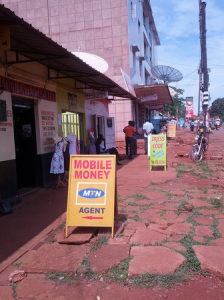Developing countries received over $400 billion in remittances in 2012 according to a World Bank (see our infographic on remittances here). This is a great example of how mobile money has changed the way people send money by making it easier and safer. This week, we read many stories detailing both progress and challenges in the sector. We are always looking for innovative entrepreneurs that piggyback on the success of mobile money to provide goods and services to previously underserved markets.
Kopo Kopo: Building the “Square of Africa” amid terrorism, monopolists, and huge opportunity by Sarah Lacy on Pando Daily
Kopo Kopo, founded by Dylan Higgins in a Seattle basement, just announced its series A round of capital totalling $2.6 million. Kopo Kopo is a Kenyan mobile payment method that has been piggybacking off M-Pesa. Kopo Kopo is based in Kenya and has provides merchants with services on a Square-like platform. Although Kopo Kopo is predominantly used as a mobile payment method, Higgins sees it as a Trojan Horse to soon develop better business tools, giving small Kenyan stores the same technology large United States stores have. Kopo Kopo gives merchants a SIM card for their phone that transforms the phone into a point-of-sale. Even with many advances, Kopo Kopo faces various obstacles that come with the nature of operating in an emerging market. In addition to competition, Kopo Kopo faces “corruption, fraud, terrorism, political systems in constant flux” which Higgins believes are reminders of Kenya’s delicate state.
Telefonica Selects Trivnet to Provide Mobile Financial Services in Latin America on PR News Wire
Recently, Telefonica chose Trivnet as its provider of mobile financial services for Latin American customers, one of Telefonica’s largest markets. Telefonica chose Trivnet because of Trivent’s “superior technology and expertise”. Trivnet was founded in 1997 and became the top choice for mobile financial services eco-systems around the world. Today it provides “the most powerful transaction management platform” to secure mobile finances. This partnership will provide Telefonica’s Movistar customers person-to-person mobile transfers, mobile commerce, bill payment, and mobile banking.
AfricaCom: MTN seals mobile money deal with Visa by Gareth van Zyl on IT Web Africa
MTN and Visa have partnered up to let mobile money users make face-to-face and online transactions anywhere Visa is accepted. MTN Mobile Money account customers can use their mobile devices to pay in stores, starting in Ghana. Throughout Africa and the Middle East, MTN has a user base of 200+ million subscribers and reaches 22 markets. Now, MTN Mobile Money has 13.4 million users and is available in 13 countries. This partnership is a step towards extending electronic benefits to all of Africa and connecting the entire Visa network. “Visa recognizes that mobile technology is the … driver of financial inclusion … to help more people improve their lives,” said Vish Sowani, head of Visa’s global mobile network operator.

Cashless Africa: Kenya’s smash success with mobile money by Matt Twomey on CNBC
What was launched as a method to facilitate microloans has turned into Kenya’s most popular method of sending money. M-Pesa took Kenya by storm, now reaching over 19 million subscribers and over 65,000 agents. M-Pesa’s outstanding market performance in Kenya can be attributed to three factors: high penetration of mobile devices in Kenya, a “killer application”, and the support of a dominant mobile carrier. Before, money arrival systems used to take days to reach rural regions and often failed, now it only takes minutes and is much more reliable. Although it provides users a way to move money, many Kenyans do not have a bank thus they cannot build credit or earn interest. In response this, Safaricom has created M-Shwari. M-Shwari is an interest-bearing savings account that came to be after Safaricom partnered with the Commercial Bank of Africa. As of now, it also offers microloans and has 1.2 million active users.
Innovations and new business models for international remittances – From MMU Seminar at GSMA 2013 NFC & Mobile Money Summit by Claire Penicaud on GSMA
At the recent GSMA 2013 NFC and Mobile Money Summit Marius Dano from Bics and Gregg Marshall from Western Union focused on four critical factor for improvement. There is a need for 1) mass of active mobile money users in receiving countries, 2) greater customer acceptance, 3) interoperability to allow transfers between various types of accounts, and 4) more regulatory frameworks. To address the challenge of customer acceptance, companies need to focus on senders, mainly economic immigrants, and develop marketing models that are appropriate for these customers. Safaricom exhibited this with its famous “Send Money Home” slogan.
37% of Nigerians Not Aware of Mobile Money Services by Obinna Chima on This Day Live
Despite the popular use of mobile money through Africa, 37% of Nigerians were not aware of the mobile money services, Philip Consulting disclosed. Out of the remaining 63% of respondents surveyed who knew about the mobile money, 35% said they earned less than N50,000 (about US$315) monthly. Improved awareness could help customers overcome their fear of a security breach on their account information and ineffective transaction processing. Despite low adoption rates, the potential for mobile money service was high. In Nigeria, people have more phones than they have bank accounts and are more likely to carry out financial transactions on their phone instead of at the bank or other devices.
- Learn about what we do.
- Follow us on Twitter.
- Like us on Facebook.
- Join us on LinkedIn.
- Add us on Google+.
- Sign up for our mailing list.
- Catch up on past Weekly Reviews.
- Fundraising for a mobile tech, alternative energy, or ag tech startup? Apply.
